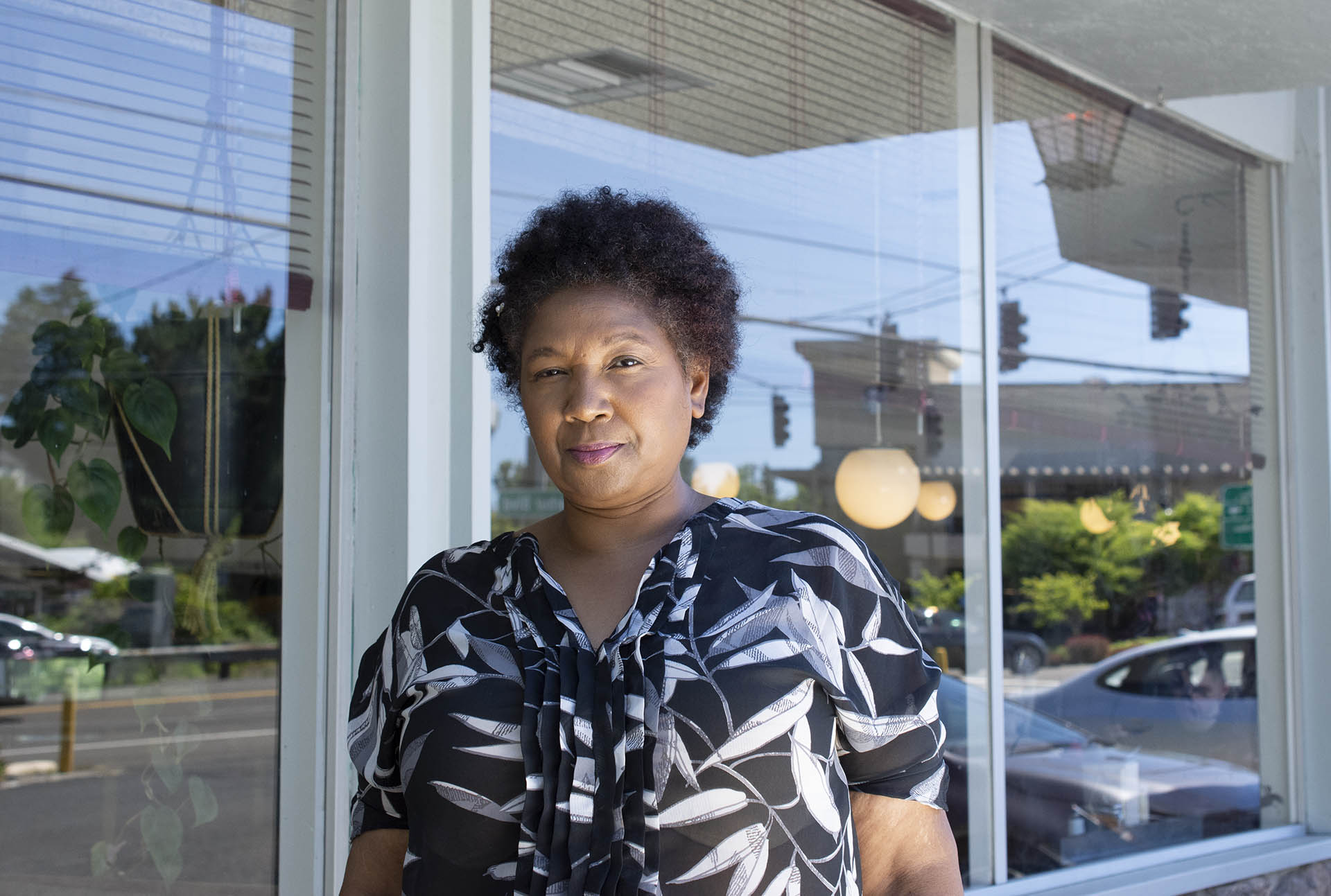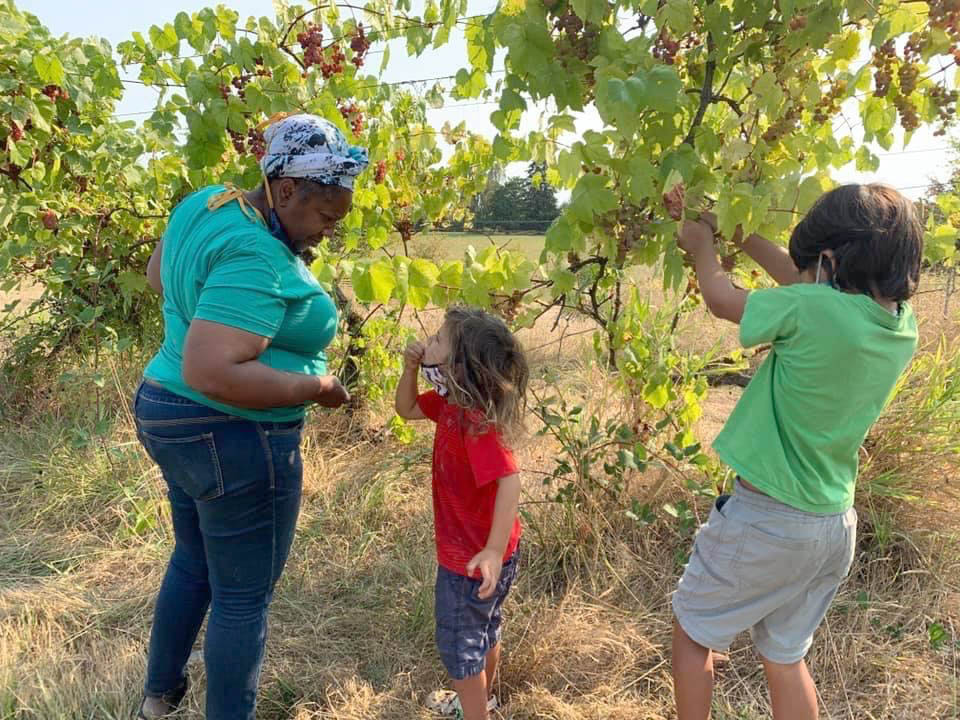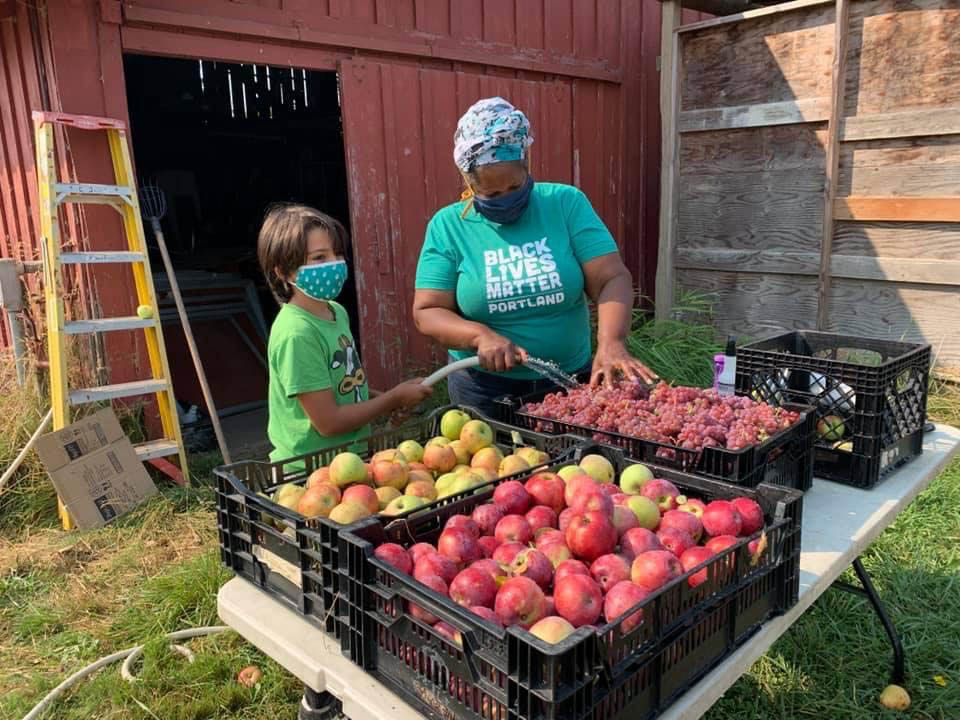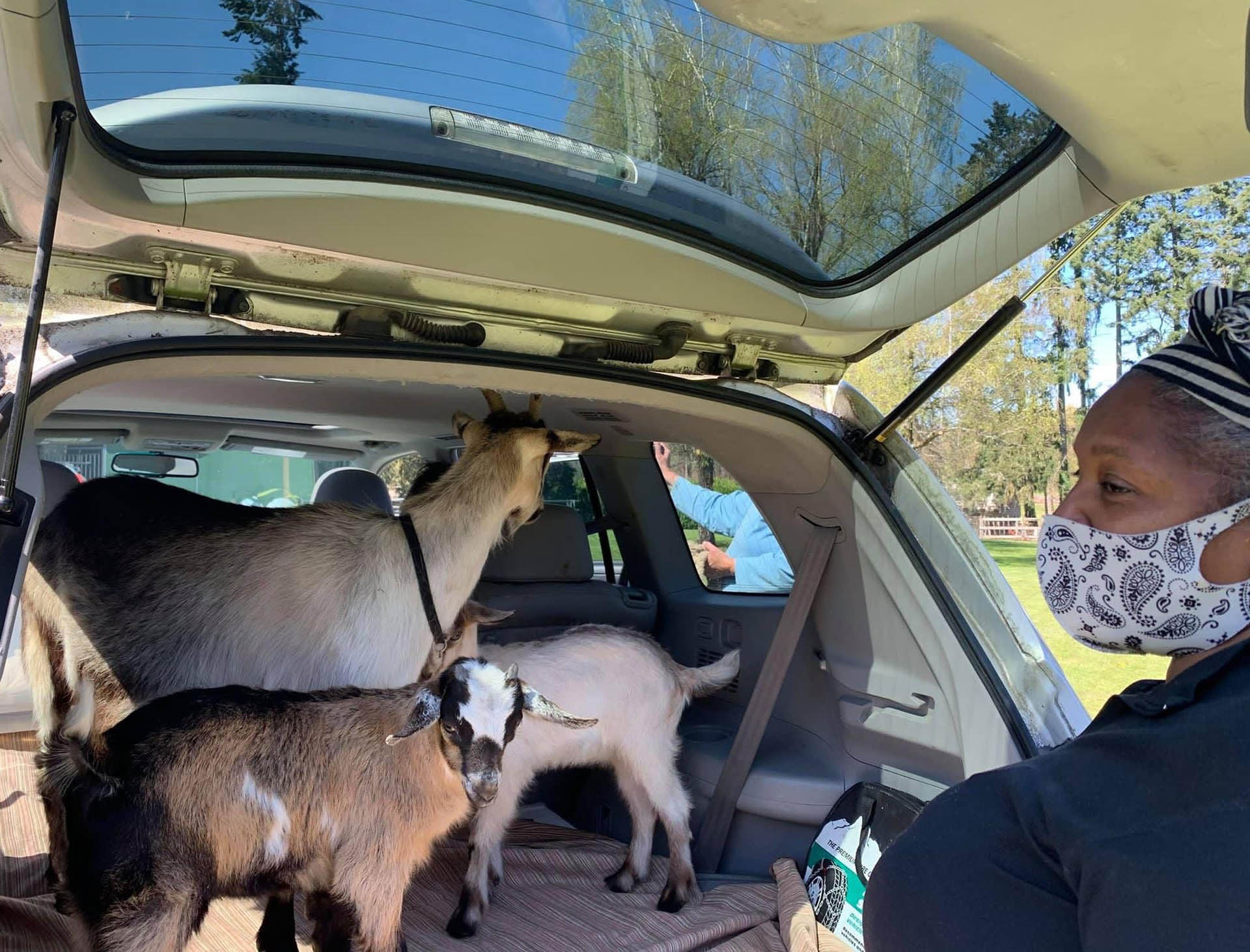
The impact of climate change
We are finding, coaching and training public media’s next generation. This #nprnextgenradio project is created in Oregon, where five talented reporters are participating in a week-long state-of-the-art training program.
In this project we are highlighting the experiences of people whose lives are being affected by climate change.
Yordanos Tesfazion speaks with Rachelle Dixon, a Black farmer who has found community with fellow farmers of color in Oregon. Dixon is passionate about educating her community on farming, especially in the context of climate change and food insecurity. She tells us of the barriers that come with not having access to land and why she centers BIPOC (Black, Indigenous, people of color) in her work.
Illustration by Eejoon Choi
BIPOC farmers utilize community to cope with climate change
Before she fled her Canby farm in the face of a wildfire, Rachelle Dixon could be found doing goat yoga on the farm or offering classes. When possible, she finds ways to share her knowledge and talents with the community.
She was born into a farming family in the Pacific Northwest, farming in the region is what she knows best.
Her passion for farming is tempered by a sense of obligation. As she makes the proactive decision to reconnect with her roots, she is also aware of her position as a Black farmer participating in a practice that can contribute to preparedness and education surrounding climate change.
“I’m just so excited that I know that I can inspire the next generation of farmers, Dixon said”
BIPOC FARMERS CREATE COMMUNITY TO COPE WITH CLIMATE CHANGE

Rachelle Dixon, a farmer in Portland, Oregon, is proactive in educating BIPOC communities about farming so that they can connect to their roots and be prepared for what climate change is doing to food supply in the United States. (Photo Credit: Jes Abeita)

Dixon helps siblings, left to right, Odin and Benjamin Smyth pick grapes at her Canby farm during a “u-pick” session in late summer 2020. Before evacuating the farm because of wildfires, Dixon regularly invited community members to pick their own produce. (Photo Credit: Aliya Smyth)
There’s a reason why so much of her community work centers on, not only BIPOC (Black, Indigenous, people of color) adults, but their children as well. She hopes that familiarizing them with farming can help create a generation of more climate-conscious people who understand the complexities of climate change and how it affects their lives. Dixon wants the younger generations to specifically focus on how climate change is affecting the food supply on the planet.
With climate change disproportionately impacting BIPOC and contributing to crises like food insecurity, Dixon is intentional in making sure the education she provides to the community will teach folks how to sustain themselves.
In 2020, Dixon relocated to Canby, Ore. on a leased piece of farmland. Farming on one-third of an acre in Portland wasn’t sufficient enough to receive government benefits. Shortly after, she became one of the 80,000 Oregonians who evacuated from the summer wildfires, which made her leave behind her farm animals. Since then, she’s returned to Portland and transitioned to urban micro-farming.
Dixon’s grandfather and great-grandfather owned their land, but lost it. “They never made the transition back to farming because the loss of land, it’s a generational thing, land is very expensive” she said.
Policies and qualifications for farm aid fail to consider the racial disparity in land ownership that are linked to the legacy of land theft from BIPOC in the United States. That disparity is why BIPOC farmers are less likely to qualify for government aid
Because land ownership is not a possibility for many BIPOC, and Dixon recognizes that, she attempts to bridge the resource gap by teaching BIPOC about Indigenous farming practices. She is also an advocate for community in BIPOC farming spaces, and once organized a BIPOC farmer’s market.

Dixon understands the importance of helping young kids learn about farming and what it entails. During a visit to her farm in Canby in 2020, Benjamin Smyth helps Dixon prepare picked produce. (Photo Credit: Aliya Smyth)

Dixon packed her goats into the back of her SUV to evacuate her farm in Canby in 2020 because of wildfires. She relied on community members to take in the farm animals because she couldn’t take them with her. (Photo courtesy of Rachelle Dixon)
The rejection of BIPOC farmers from the mainstream farming world is directly tied to the same systems that contributed to the land theft BIPOC farmers faced since the founding of the United States.
“So at the turn of the century, we had 19 percent of the land. We were 19 percent of the farmers and now we’re 1.9 percent. So we went, in 100 years, we went down. And now we don’t own the land. I didn’t own the land in Canby,” Dixon said.
Dixon has found support in the community and she gives back when she has access to resources that can be shared. “The BIPOC community definitely pulled through with helping me harvest and helping me get good food to people, finding out where I can get heirloom seeds, finding out where I can get better seeds,” she said. In return, Dixon prioritizes the community.
Now, after years of working and saving, she has finally purchased land in Springfield. “I’m looking forward to hosting children at the farm, and then also hosting some adults and bringing back that knowledge that’s indigenous to them, Dixon said”
Dixon’s family farmed during segregation, there wasn’t any freedom with who you were in community with, and climate change wasn’t part of the national conversation. Fast forward to the 21st century, and Dixon is continuing her family’s legacy of farming while educating about the dangers of climate change in order to better prepare a community she found as a result of rejection, just like her grandfather and great-grandfather.
Audio Transcript
Rachelle D. Climate impact is already here for farmers. So every year, it’s going to be a surprise for farmers, every year.
Rachelle D. My name is Rachelle Dixon, and I’m a farmer, and a chef. And I’m native to the Pacific Northwest. I was born in Seattle, Washington, and raised in Portland, Oregon. And I’m the first generation off the farm and the second generation off the reservation.
Rachelle D. I wound up in Canby because after I left my home with 1/3 of an acre, there wasn’t any place that I could see that had like a flat space that was within my financial capacity that I could farm on.
Rachelle D. We need to make sure that we have better funding for BIPOC farmers, especially African American-born farmers. There’s oftentimes an emphasis on immigrant farmers, because they’re new, and they have the least amount of resources in the United States. But what often proves to be true is African Americans are left behind in those programs. So at the turn of the century, we had 19% of the land. We were 19% of the farmers and now we’re 1.9%. So we went, in 100 years we went down. And now we don’t own the land. I didn’t own the land in Canby.
Rachelle D. When you’re doing this little bit of micro farming, no one is taking you really seriously, even if those are the first steps you take to being a farmer, all of that is good experience.
Rachelle D. So climate impact, it’s not something that’s coming 20 years from now. This weather was so wet in the Pacific Northwest, that some crops were delayed. Some crops had lesser yield.
Rachelle D. Once you own the land, you can get assistance with addressing climate change.
Rachelle D. The USDA will give you grants for areas that you’re not able to plant. Because of climate change, or the results of the impact of climate change, they will also give you loans for mitigation.
Rachelle D. Right now, most of it is just paying farmers for their loss of production, which you can see why that is not going to be sustainable, because instead of paying people for the loss of production, it should just be an automatic grant toward control, climate, erosion, water systems, it should be addressing all that. Because paying you, that’s money, then you’re gonna put it back into the same system that didn’t yield year after year.
Rachelle D. Would my family’s farming survive what’s going down with climate change? 100%. I have a farming method that’s over 1,000 years old. It always works. It works when you’re in the desert. I know how to farm the desert.
Rachelle D. There’s so many things that you could do that back then they were told were backwards, that now are considered “ooh, this is organic. Ooh, this is the way that we can heal the planet.”
Rachelle D. This is why we need to have more BIPOC farmers.
Rachelle D. We have a relationship with the land.